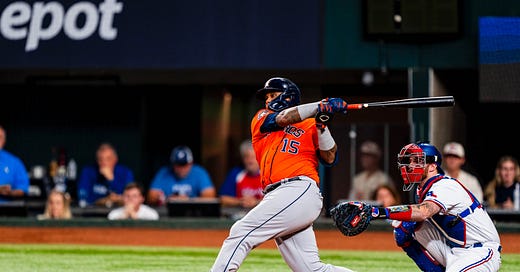The Hits Were Hard and the Hits Were Timely. My Game 3 Analysis
The Astros got more opportunities with runners in scoring position in Game 3 and did better in those opportunities than the first two games of the series. And they did that by hitting the ball hard.
The Astros lost the first two games of the ALCS because they could not drive in a runner in scoring position. They had nine opportunities to do so in Games 1 and 2 and only managed a single that could not score a runner from second.
Last night, in Game 3, the Astros drove in six runners who had gotten to scoring position. Overall, they were 5 of 12 with runners in scoring position and on four of those hits, they were able to drive in runs.
And the Astros were able to drive in runs, to score eight times on twelve hits primarily because they hit the ball very hard. Astros hitters had 17 hard hit balls off of Rangers pitching on Wednesday night, including nine against starter Max Scherzer. Seven of those hard hit balls fell for hits.
In fact, the Astros probably should have scored more. Four the flyball outs the Astros hit hard landed in areas that would be a home run in some, if not most, parks across baseball. The Rangers pitching staff was spared more damage only by the cavernous dimensions of Globe Life Field.
Mauricio Dubon began the hard hit parade with a 104.8 mile per hour single. The ball was hit so hard that Yordan Alvarez had to be held at third base.
Fortunately, two batters later a wild pitch by Scherzer allowed Alvarez to score. The Martin Maldonado got the second hard hit base hit of the game, sending a liner between the third baseman and shortstop to drive in two runs and post the Astros to a 3-0 lead.
In the third, Jose Altuve proved you could actually hit the ball out of Globe Life Field, sending a ball with a 104.4 MPH exit velocity into the left center field seats. 4-0 Astros
In the fourth inning, Jose Abreu sent a ball 112.5 MPH to the left center field gap for a double. Two batters later, Mauricio Dubon sent a 102.5 MPH liner into right center to make it 5-0 Astros.
The in the top of the 9th, Yordan Alvarez hit the hardest ball of the game at 114.8 MPH. It was so hard that the richochet off the right field fence was hard and went right to Rangers right fielder Adolis Garcia, who held Alvarez to a single. Two batters later, Kyle Tucker hit one 106.6 MPH
In short, they hit the ball very hard, especially against Scherzer, who looked like a pitcher who needed a rehab start or two after having been on the IL since early September.
Soft Contact Produces Runs Too
Of course, hard contact is not the only way to score runs. In many ways, the biggest hit of the game was a soft contact special. In the top of the seventh, the Astros led only 5-2 after Josh Jung hit a two run home run for the Rangers. But the Astros were able to load the bases courtesy of singles by Maldonado and Altuve and a two-out walk to Alex Bregman.
Yordan Alvarez was at bat and Will Smith pitched him well, getting a fastball inside but on the plate. Alvarez did an excellent job of hitting, pulling his hands close to his body while swinging. That limited his power, but still allowed for contact on the ball, which Alvarez looped over the shortstop’s head for a base hit, driving in two and making the lead 7-2 Astros.
The tale of this game comes from the Astros success with runners in scoring position, But it also is told by the number of opportunities. In Game 1, the Astros only had three plate appearances with runners in scoring position. In Game 2, they only had six. Tonight, they had 13 plate appearances with runners in scoring position.
In short, the Astros were able to give themselves a lot of opportunities to score runs tonight, which they had not done enough of in Games 1 and 2. And then they were able to take advantage of those opportunities—getting six hits and one walk with runners in scoring position.
A High Scoring Game 4?
They’ll need to do both again tonight in Game 4. Both team will use their fourth starter, which for the Rangers is left hander Andrew Heaney. But don’t expect him to pitch for long. Heaney faced only 14 batters over 3.2 innings in Game 1 of the Rangers series with the Orioles. He was lifted for Dane Dunning who went 2 innings as a piggyback starter.
In short, the Rangers are starting the starters they have the least confidence in and are trying to limit both Heaney’s and Dunning’s exposure to opposing batters. The Astros bats need to take advantage of that.
They also need to take advantage of Heaney and Dunning because the Astros are starting their fourth starter in Jose Urquidy. Urquidy has been very good in his last two starts, but was out of the rotation through most of the final two months of the season due to ineffectiveness. The Rangers have a deep lineup, so I expect them to score runs against Astros pitching. The Astros need to do the same.
And if they hit the ball like they did in Game 3—hard and at the right time—then the Astro bats can absolutely slug their way to another victory.





